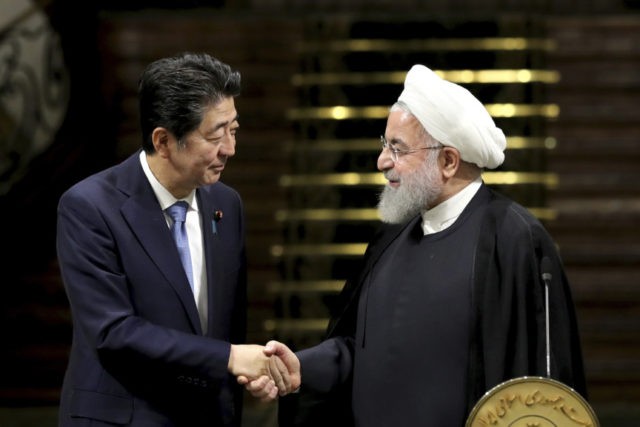Japanese Prime Minister Abe Shinzo traveled to Iran to meet with the Islamic Republic’s Supreme Leader Ayatollah Ali Khamenei on Thursday, embarking upon an endeavor to ease the unprecedented tensions plaguing the relationship between Tehran and Washington.
Iran’s semi-official Tasnim News Agency reports:
In a meeting with Iranian President Hassan Rouhani on Wednesday evening, Abe said the main purpose of his trip to Iran is to ease the tensions and expressed hope that his visit would result in the reduction of tensions and establishment of peace in the region.
While briefing reporters on Thursday, U.S. Secretary of State Mike Pompeo accused Iran of being the culprit behind Thursday’s attack on two oil tankers in the Gulf of Oman, forcing their crews to abandoned ship. Pompeo vowed to deploy more military assets to the region to protect commerce.
“Iran will never initiate war but will give a crushing response to any aggression,” Rouhani declared during a joint news conference with Abe on Wednesday, Saudi Arabia’s Al-Arabiya reported.
Iran is reeling from an unprecedented wave of U.S. sanctions and American President Donald Trump’s decision to deem its elite Islamic Revolutionary Guard Corps (IRGC) a foreign terrorist organization — known to spread Iran’s Shiite form of Islam across the world via Iranian cultural centers used as recruiting facilities and disseminated across Latin America and beyond.
Abe’s visit on Thursday came in the wake of a decision by U.S. President Donald Trump’s administration to deploy aircraft carrier warships, B-52 bombers, to the Persian Gulf; a new Patriot missile system to the Middle East; and about an additional 1,500 troops to counter Iran and to defend against missile threats from the Islamic Republic.
There are still thousands of American troops fighting the Islamic State (ISIS/ISIL).
The Pentagon is also expected to send additional intelligence and reconnaissance aircraft, engineers, as well as a fighter aircraft squadron “to provide additional deterrence and depth to our aviation response options,” the Hill reported.
During his meeting with the Shiite supreme leader Khamenei, Abe urged “more patience” on all sides of the conflict.
In response, Rouhani vowed that Iran would offer a “crushing” response if the U.S. attacked.
The Associated Press (AP) quotes Abe as telling reporters after meeting the Iranian supreme leader:
At the moment, tension is rising. We should do anything we can to prevent an accidental conflict from happening, and Iran should play its constructive role. There is [the] possibility of [an] accidental conflict, and a military conflict should be prevented at all costs.”
Abe’s warning came hours after the Yemeni army reportedly proclaimed that the most advanced U.S. defense system failed to intercept the cruise missile fired by the Houthis at a Saudi airport, wounding 26 people, Yemeni Brig. Gen. Yahya Saree reportedly proclaimed.
Some news outlets claim that the Houthis – who control vast areas in an around the Yemeni capital Sanaa, including territory along the Saudi border – have conquered territory inside the Sunni kingdom.
Brewing confrontations between Iran and the U.S. trigger fears of another war in the Middle East, home to the worst humanitarian crisis in the world in Yemen.
Abe’s trip to Tehran marks the first Japanese leader to travel to Iran since its 1979 Islamic Revolution. In addition to addressing tensions with America, the Japanese prime minister discussed the Joint Comprehensive Plan of Action, more commonly known as the Iran nuclear deal.
During a joint conference with Khamenei, PM Abe indicated he strongly supports Iran continuing to observe the nuclear deal, Saudi Arabia’s Al-Arabiya notes. Iran and Saudi Arabia are regional foes.
“Iran will remain committed to the [nuclear] deal, which is important for the security of the region and the world. Tehran and Tokyo both oppose nuclear weapons … Iran will never initiate war but will give a crushing response to any aggression,” Rouhani reportedly told a joint news conference with Abe.
Arguing that it failed to live up to expectations, particularly when it comes to combating Iran ballistic missile program and not addressing what some U.S. officials describe as the Islamic Republic’s malign influence across the Middle East, President Trump pulled the United States out of the 2015 accord between Tehran and U.S.-led word powers — Russia, China, France, Britain, and German.
AP points out:
Already, Iran says it quadrupled its production of low-enriched uranium. Meanwhile, U.S. sanctions have cut off opportunities for Iran to trade its excess uranium and heavy water abroad, putting Tehran on course to violate terms of the nuclear deal regardless.
Some of the non-U.S. signatories to the Iran nuclear pact have been working to preserve the pact despite that Tehran has already begun enriching uranium.

COMMENTS
Please let us know if you're having issues with commenting.